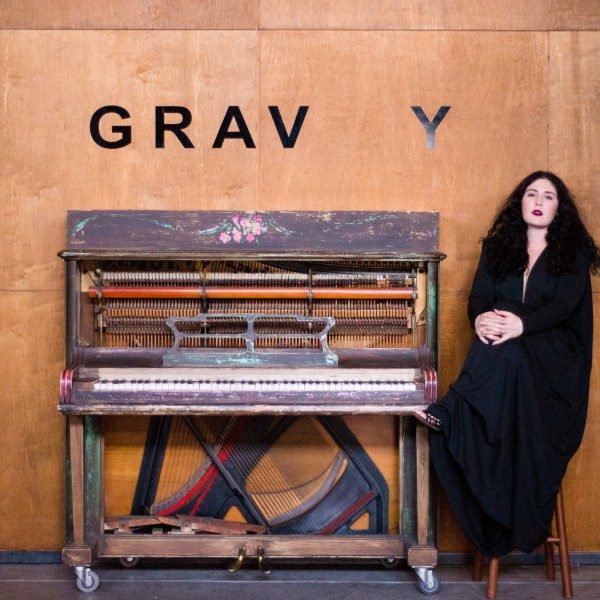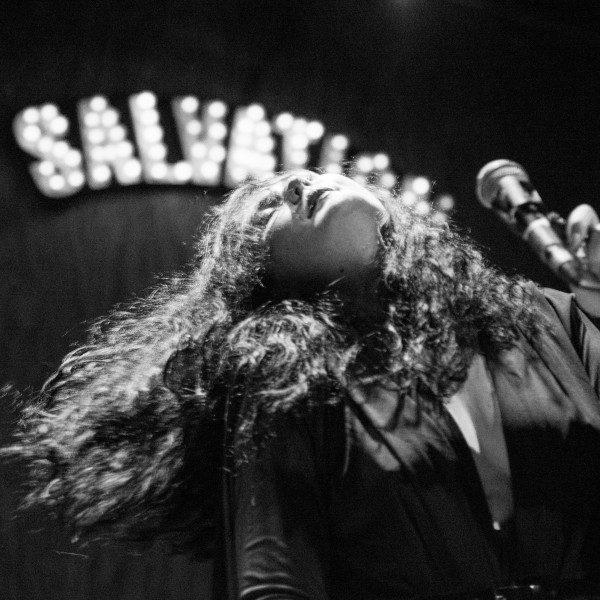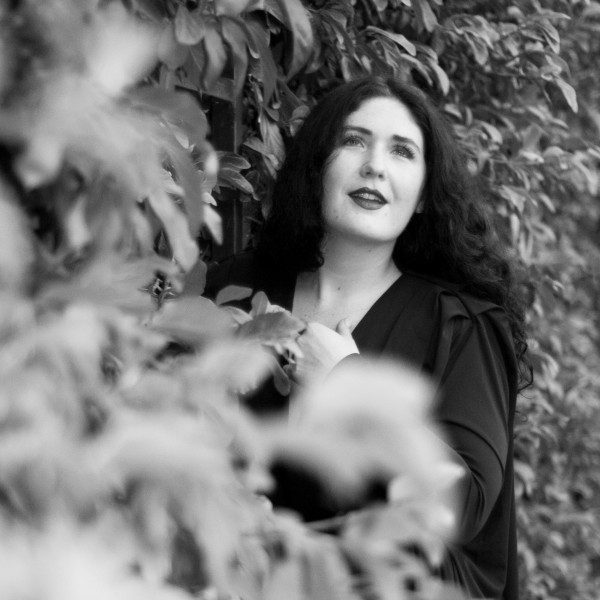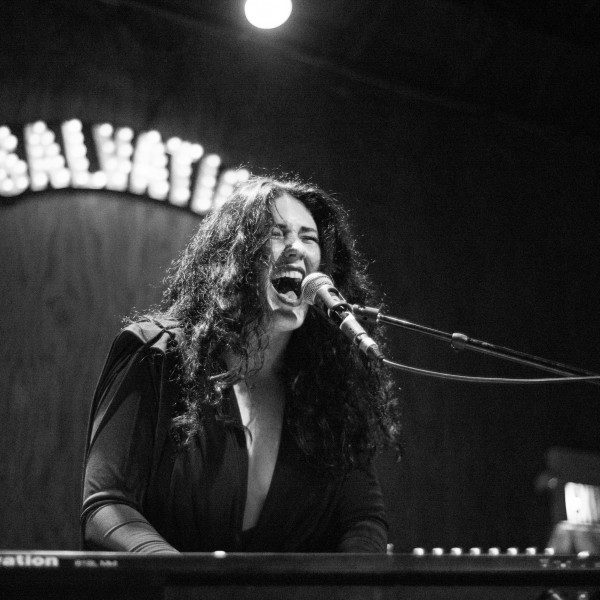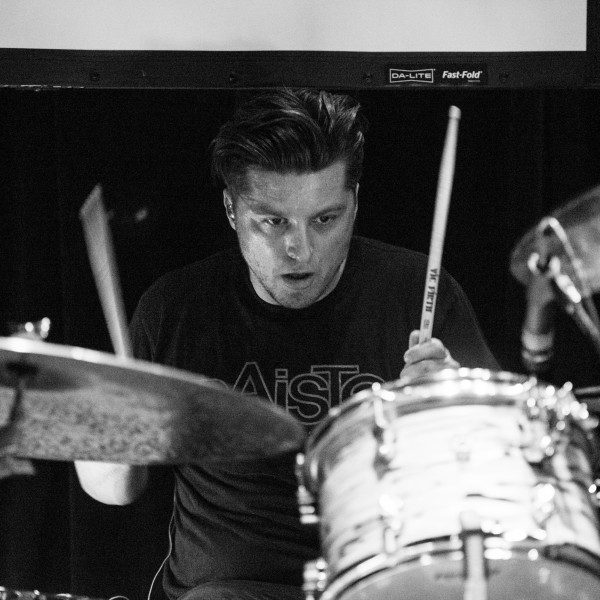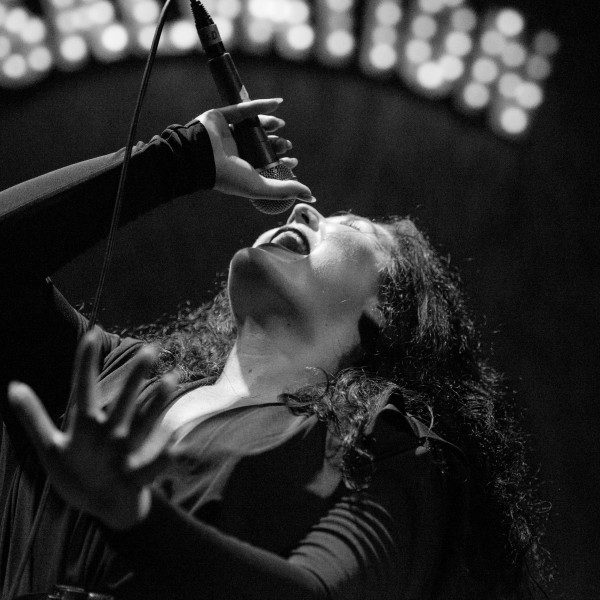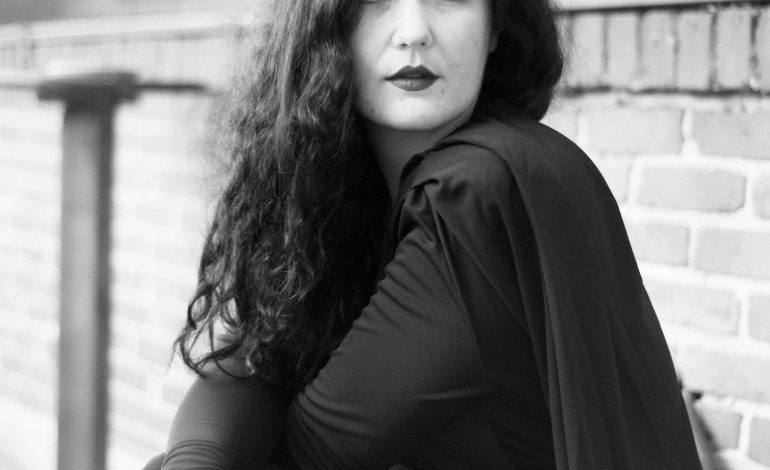

Morgan Kibby shot for mxdwn by Sharon Alagna
In May of last year, former song writer and keyboardist of M83, Morgan Kibby, released her debut album titled In Cold Blood. Penned at the time of a painful break up while on tour with M83, In Cold Blood was written and produced as an outlet on the road for her emotional distress during the beginning stages of her grieving process. This year long project resulted in an unapologetic last letter to an ex-lover in the form of a provocatively empowering album. Fueled by anger, pain and a girl’s innocent search to make sense of it all, In Cold Blood is everything a brokenhearted lover needs to get through “all the shit” of a break up and keep from wallowing in self pity.
So far in your career, you’ve fronted the Romanov’s, collaborated and toured with M83 and released an EP and debut album as the White Sea, how would you say each of the groups differ?
Well, I think with any artist, you need to take the time to learn what it is that you like. In my particular case, I really really like so many different kinds of music so all three of the projects (gosh, there are more than a few projects I’ve been involved with) but of all the projects I’ve been involved with, they are all different sonically. Obviously, M83 is a particular case because it wasn’t my project to begin with- Anthony brought me on as a musician, writer and performer.
I think it is important to take the time to figure out what it is you are trying to communicate with your sounds and for me it has taken a little bit longer than maybe with others. I definitely feel like In Cold Blood was kind of like my first experimentation making music completely on my own- producing, writing, etc. It’s kind of an expression of all these very different kinds of music. Whether it’s score music with cinematic elements, disco, etc. So, I think they are all reflections of being on that journey trying to find what it is that inspires you or more of a point of what type of music you want to use to express you vision.
I read that your musical background began in the theater, playing the classical piano. When did you begin songwriting and singing?
I started dabbling in songwriting when I was probably 19-20. I had actually thought I was going to be an actress and I had been in the theater and working in television and short films and such up until that point. I had always been musical, but I had never really considered making music a career until I decided to stop acting… I didn’t really like the culture that surrounded it… It was very frustrating waiting for the phone to ring to be creative.
So when I quit that, I knew I needed to express myself in some creative way and music was just kind of a natural thing that I fell into. I started pairing my writing with my playing of piano and it just kind of evolved from there.
WOW! That’s pretty amazing that you were able to make the transition so quickly and successfully.
I’ve been really lucky. I’ve had many different incarnations in my life. I was an athlete for a long time. When I was a kid I was a gymnast and I went to nationals and then I quite that and I started acting and then I quit that and then I went to music… [laughs] I’m trying not to quit… hopefully this will stick. [laughs]
When you made the transition into songwriting and singing, did you have an inspiration? Or maybe somebody you looked up to as a songwriter?
No, not necessarily. I’ve always gravitated toward the greats like Joni Mitchell and Sarah Vaughan as a vocalist and the list goes on and on. Obviously, PJ Harvey was a huge influence for me as a teenager. There wasn’t anybody in particular that I was like “Oh my god, I want to make music like that”. I think because I came from a classical theater background, my natural and first inclination was to write more of like ballad-y type music, which is why I think I started off with a project frankly more theatrical than pop oriented or rock oriented. And I was listening to things like Rasputina and the Dresden Dolls so it was natural for me to kind of start making music within those sub genres. But, I think it’s really been the last 8 years that I’ve been trying to discover what it is that I really want to do musically. Writing songs is one thing, but producing them is another. It’s just kind of figuring out what genre I gravitate more towards now, years later.
When did you decide to put out a full length album?
I think I’ve always known it was in the cards. I knew I wanted to explore what White Sea was. I put out an EP after one of our last tour cycles with M83 and I had been remixing a ton. I think I was probably more well known as a remix artist than a solo artist. So, when I got off tour for that, I did my EP and that was like dipping my toes into the water. With M83, it’s not a constant. Anthony likes to work with lots of different people and I happened to have worked on the last two records, but it’s never a given that I’ll be involved in the next one. So, I knew that if I wanted to continue to make music, I needed to create other opportunities for myself. It was the most natural thing for me to jump into producing stuff for myself and to continue to do remixes. While we were on tour, it was kind of like okay I did an EP, now the next natural step is to write a full length record.
And it turned out beautifully. How long did it take you to write the album?
It probably took me about a year, but I was writing on the road, so I wasn’t in a studio. I was in the back of the bus trying to snatch moments to record vocals and program. I was in the back lounge with the door closed trying to make music as we were hurdling ourselves across the country. [laughs] It was really me sitting and writing where I could.
And a year is really not that long to write and record an album given how you worked on it. I mean, that’s amazing that you got all that done without being away from the world in a studio.
Thank you, I had a lot to write about.
When I first heard “Prague” and “NYC Loves You” really got me and for “Future husbands Past Lives” the intro kind of reminded me of the Backsteet Boys’ “Everybody” so I was immediately in love because they were my childhood favorite. Can you walk me through the production process of the album?
My process for In Cold Blood was that I would sit down and I would usually start with a beat and then fill with a synthesizer sound for god knows how long and then start to write verses and choruses. So, it was all very contained, it was all in a box. I really didn’t do any writing with any organic instruments. Like I didn’t sit down with the drums, I didn’t sit down with a guitar or at a piano. It was mostly synth and programming. Once the song had been fully fleshed out, written and arranged, I started working with a dear friend and engineer, Mike Schuppan. We literally blocked out two weeks, and recorded guitars, drums and we just recorded on top of what was already there. So, there’s are a lot, a lot of layering on the record. It’s an extremely dense production style. I don’t know if I’d do it again, but I’m glad that I did it for that record. I think it was appropriate.
And how did you get into electronic music? I had read that M83 had introduced you to a new side of electronic music. How did you start that exploration?
Yeah, it all started when I was a teenager, frankly. I heard Nine Inch Nails and I was like “What. The. Fuck. Is. That.?” [laughs] I was blown away by this idea that rock n’ roll could sound so mechanic. The sounds that Trent comes up with, whether they were samples or created with synthesizers were just mind blowing to me. And that was the first time I genuinely fell in love with “electronic” music. Industrial music in my mind has a lot of electronic elements as soundscapes, so that was kind of my first awakening to that kind of music… so I went through like an industrial goth phase. [laughs]
And then, when I met Anthony, it was like a whole new universe of electronic music because I moved into listening to things like Tangerine Dream so it was very eye opening. You know, especially in 2014-2015, we get electronic music in a totally debased, ignorant form shoved down our throats everyday with pop music and we forget that the 70s were like this golden era of synthesizers. You have bands that are really exploring low burns and development of sounds and Anthony clearly (he spent 5 albums before he had a huge hit) is exploring that and I was lucky enough to be on that journey with him. For Saturday’s Youth, I was in the studio with him a lot and in our shows too, he is very conscious about sound and I took a lot of cues and I just learned a lot by being in that environment and being with a leader band, too. It was just very genius with sound and very eye opening, learning how to use synthesizers to craft mood and texture and frankly form the song writing process.
You explained everything exactly how I see it as well. I know a lot of people, when you say electronic music, they think of what’s on the radio and so they are very quick to say, “oh I’m not a fan of electronic music.”
Yeah, and that’s not electronic music in my mind. I mean obviously it is because they are using the process and stuff like that, but when you are introduced to real masters of electronic music, I mean, just listen to the Blade Runner soundtrack, that’s electronic music in my mind. That genius sound, sound design and texture. It’s a shame that the younger generation that maybe hasn’t been introduced to that stuff is unaware that that’s the verse of electronic music.
Aside from the great beats and rhythms in your music, the lyrics really stand out as well. To me, the album’s lyrics are a great depiction of a young women’s internal battle with lust and the idea of love. The language, while vulgar, captures the subject’s innocent optimism, desperation, confusion. I may have taken it all wrong, but how would you describe this album to a stranger who doesn’t quite know the background or the writing process?
Yeah, I think you are very observant. As women, we are very often forced into a corner when we want to talk about our sexuality. I was in my mid to late 20s and was dealing with THAT time in life, that seems like nobody can escape, when your life just kind of falls apart and you’re forced to shed your skin and become an adult, really. And, in that experience I was confronted with a lot of mistakes I had made, a lot of poorly thought out decisions, a lot of unconsciousness about my own behavior and who I wanted to be in the world and a lot of it came out through talking about my sexuality. I think that is something that can be a tool to describe an experience with so many different things like pain, loss, wander. It can be so many negative and positive things and I just felt like the only way for me to really communicate my experiences was if I tried to make that idea of sexuality a little more multi-faceted in the way that I was using it in my songs.
And I found that by doing so, it made your music a lot more honest and I know a lot of people can relate to being in similar situations.
It’s very raw, I can’t deny that. I don’t really care… I’m not embarrassed to talk about that kind of stuff. It’s very exposing, obviously. It’s funny, I’m much more conservative now, I think, than when I wrote these songs. It’s been a couple of years since I’ve written them, and I’m much more adult, or at least I think in some ways I am…I hope. [laughs]
I look back at some of the lyrics and I think “wow, you’re really letting it all hang out there, Morgan”, but I think that in order for those songs to be honest and in order for the lyrics that pertain to sexuality to not become one dimensional and trite. I had to really go for it and use those feeling within a larger context of the real loss that I was going through, the relationship I was losing at the time.
At first listen, I just focused on the beat and I was like “this album is really fun” and then when I did a little more digging and really listened to the lyrics and found they brought a whole different element to each of the songs. I think you found a great balance. It wasn’t an album that was all emotion. You were able to find an up-beat way to present your experience.
Yeah, I’ve actually heard that before in other interviews. I was really going through a process of grief and I literally could’ve charted on a calendar going through the different phases- the denial, the rage, the sadness, the acceptance, etc. I think I wrote a lot of songs when I was angry, when I was in that angry stage, and so instead of feeling sorry for myself, it came out as a lot of fiery energy. I was angry with myself, I was angry with the way I was being treated by others and a lot of my songwriting happened in that phase of grief and that’s why I’m not feeling sorry with myself on the album. I’m really just trying to work through the shit.
I love that! Right now, you do not have a tour announced, but are working with producer/writer Jake Sinclair on new music that you’ve described helped you to figure out what White Sea truly is and needs to become. Can you expand on that?
I’ve never been more excited about the music that I’m making and I think that I’ve finally found the identity of White Sea that I’ve been searching for over the last 6-7 years. I didn’t want to do it by myself again, I didn’t want to just sit there and scratch my head. I really just wanted to make some songs for fun and I didn’t really have any intent of doing something with them, but they ended up being so good and we recorded them in a really unique way.
I co-wrote some songs with Jake and then I co-wrote also with Daniel Nigro. He’s a fantastic songwriter and he and I actually haven’t known each other that long (it’s only been 5 months or so), but we clicked immediately and wrote 3 songs I’m just absolutely in love with. Jake and I know each other because we’re managed by the same person and we’ve always been friends and have collaborated on songs for other people and then one day we finally looked at each other and were like “why aren’t we making a bunch of songs together? This doesn’t make any sense.”
We had so much fun working together and he’s just brilliant. He’s so good at what he does and I was very lucky that he had a whole in his schedule because he’s always working on giant records all the time. We took the last couple of weeks of 2014, went to Butch Walker’s Studio and we recorded 6 songs with an absolutely incredible musician and literally just did one take of everything! It’s really different, like we did a couple of over-dubs with some synths, but it’s very 1970’s. I really found the direction in my writing that I’ve been looking for. It’s not electronic music, I can tell you that much [laughs] I mean there obviously are tons of synths and there will always be because that’s my first passion, but I was really excited about this idea of bringing more earthy and emotional back to my pop writing, instead of having it be so glossy and over the top. It’s definitely a lot more raw and I’m really really excited to share the songs with people.
And just to follow up, unless there is a giant demand for me to be touring, I really don’t have any interest in touring. I love playing shows, but I’m also not 22 anymore, so getting into a band and flogging it out is just not for me. It has nothing to do with thinking that I need to be playing for larger audiences, it has nothing to do with that, I just physically can’t do it anymore. I’ve been doing this since I was 22 and did that with M83 and I was in the van with him and then went to the bus. Touring is just so zapping of life blood. Unless there’s a real reason for me to tour, I’d rather be scoring films and making new music and I’d rather be creating that way than trying to scrounge for coffee at a rest stop.
But, I do hope to be able to tour again, I would absolutely love that, there just hasn’t been the right opportunity to do so.
Well, we look forward to hearing your new music. Do you have a release date in mind for a new album?
You know, I’m actually not going to be releasing another album. I’m going to release songs. I don’t really think the future of music really is releasing records from unknown artists. I don’t really think anyone gives a shit about me releasing an album, to be perfectly honest. People care about songs and when I really can figure out who my audience is, then, I think, is the right time to be releasing an album. But until then, I’m not really interested in doing things the way we are “supposed to do it”. For me, as a creator, it’s just not interesting anymore. I want to try new things, and I see the way people can do music, so I don’t think I will be releasing an album anytime soon. I think I’ll just be putting out songs for now.
Morgan Kibby shot for mxdwn by Sharon Alagna

